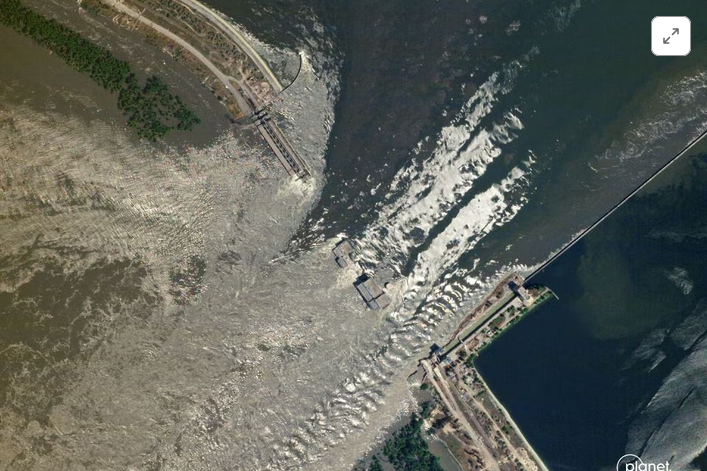CCB´s statement on the demolition of the Kakhovka dam in Ukraine

A satellite image shows damaged Nova Kakhovka Dam, amid Russia's attack on Ukraine, in Kherson region, Ukraine, June 6, 2023. PLANET LABS PBC/Handout via REUTERS
9 June 2023 - Coalition Clean Baltic – CCB, the international network of environmental NGOs from the Baltic Sea Region, has condemned the unprecedented violence and aggression of Russia against Ukraine since the first day of this brutal war. It was obvious from its very beginning that, besides millions of human lives, nature will be severely damaged in any environmental compartment – land, water and air. Evidences of impacts were piling up and ranged from destruction of environmental infrastructure and contamination of soil to devastation of nature protected areas and extermination of flora and fauna.
On 6 June 2023, the dam of Kakhovka hydropower plant that was under control of Russian troops, was demolished, causing an immediate, uncontrolled and massive discharge of water from its reservoir, the biggest in Ukraine in terms of water volume. It has led to a large-scale man-made disaster across middle and lower Dnipro River catchment, the consequences of which will be felt for decades.
Besides catastrophic flooding of numerous settlements downstream with total population of tens of thousands of people, this accident will inevitably have severe environmental impacts affecting the area of over 5000 km2 both down- and upstream the destroyed dam. These foreseen impacts will include contamination of drinking water, flushing large volumes of polluted water and sediments into the Black Sea, death of large numbers of fish, waterfowls and benthic fauna, destruction of coastal habitats and numerous protected areas, changes in overall climate regime of the region. The lack of water supply upstream will have significant socio-economic consequences causing dehydration of the irrigation system of the agricultural sector in Kherson and Zaporizhzhia regions, shutdown of industrial enterprises, creating risks for cooling reactors of Zaporizhzhia nuclear power plant, largest in Europe.
It will have long-term and potentially even irreversible impacts for both Ukraine and for the European environment in general.
In support of our Ukrainian friends, members and partners, CCB urges the international community:
- to appeal to your governments to condemn the actions of the Russian Federation causing yet another stage of a humanitarian catastrophe and act of ecocide;
- to unite the efforts, capacities and competences in thorough investigation and evaluation of impacts of the Kakhovka dam demolition, as well as minimizing those;
- to take active steps in engaging international organizations (e.g. Bucharest Convention, Helsinki Convention and UNECE Water Convention) and mobilizing resources to immediately address this disaster, plan recovery actions and prevent similar accidents in the future.
Together, we have the power to change the course of events and make those responsible for this disaster liable. Let our voices be heard and our actions be an example of solidarity and responsibility towards nature and humanity.


